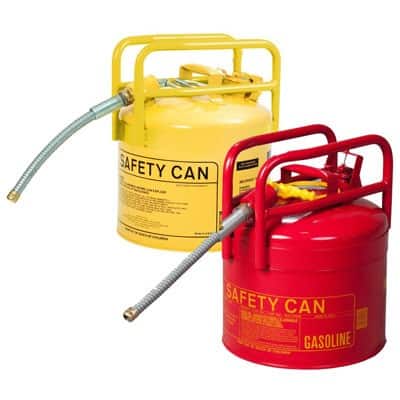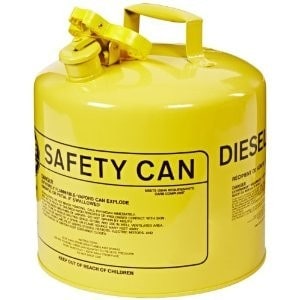The very nature of flammable liquids requires careful handling and storage.
When it comes to fuel containers, not just any material will do.
Gas can material safety standards exist to ensure that the containers used to store and transport gasoline and other flammable liquids are up to the task, preventing leaks, spills, and potentially catastrophic accidents.
This article delves into the crucial world of gas can material safety standards, providing insight and guidance on how to store and transport flammable liquids safely.

The Importance of Gas Can Safety
When dealing with flammable liquids like gasoline, the margin for error is small. A single spark near a leaky gas can could lead to a devastating fire or explosion. This is why safety standards for gas cans are not just recommendations; they are critical measures designed to protect life, property, and the environment.
The Risks of Improper Storage
Improper storage of flammable liquids can lead to several risks, including fire and environmental contamination. Gasoline, for example, can release harmful vapors that, if ignited, can cause fires that spread rapidly. Additionally, if gasoline leaks into the soil or water systems, it can cause long-term environmental damage.
Regulatory Bodies and Standards
In the United States, the Occupational Safety and Health Administration (OSHA) and the Environmental Protection Agency (EPA) set guidelines for the safe handling and storage of flammable liquids. These agencies refer to standards set by organizations such as the National Fire Protection Association (NFPA) and the American National Standards Institute (ANSI) to guide their regulations.
Understanding Material Safety Standards
The material used to construct a gas can is a critical factor in its safety. Standards specify which materials are suitable, taking into account their durability, resistance to punctures, and ability not to degrade when in contact with flammable liquids.
Types of Materials Used in Gas Cans
Gas cans are typically made from two types of materials: metal and plastic. Each has its advantages and disadvantages, but both materials must meet safety standards to be considered safe for use.
- Metal Gas Cans: Often made from steel, metal gas cans are sturdy and resistant to punctures. However, they can be heavier and more susceptible to rusting if not properly maintained.
- Plastic Gas Cans: Plastic gas cans are usually made from high-density polyethylene (HDPE), which is lightweight and less likely to corrode. They must be made to specific thickness standards to ensure they are robust enough to safely contain gasoline.
Standard Specifications
Safety standards for gas can materials focus on several key areas:
- Durability: The material must withstand normal wear and tear without compromising the can’s integrity.
- Permeability: The material must prevent gasoline vapors from escaping, which could lead to a fire hazard.
- Chemical Resistance: The material must not degrade when in contact with gasoline or other flammable liquids.
- Ignition Resistance: The material should not be easily ignitable and should be designed to prevent sparking.

Features of Compliant Gas Cans
To meet the required safety standards, gas cans must include several design features:
Flame Arrestors
Flame arrestors are safety devices that prevent a flame from entering the container, which could ignite the vapors inside. These are now a mandatory feature in portable gas cans.
Pressure Relief
To prevent rupture due to overpressure, especially in changing temperatures, gas cans must have a way to relieve pressure. This is often achieved through a venting cap or other mechanism.
Spill-Proof Systems
Spill-proof systems, such as spring-loaded caps and automatic shut-off features, help prevent accidental spills during pouring or if the can is tipped over.
Child-Resistant Closures
Given the hazardous nature of the contents, gas cans must have closures that are difficult for children to open, reducing the risk of accidental ingestion or spillage.
Labeling
Proper labeling is required to inform users of the contents and the risks associated with them. Labels must be durable and resistant to the solvents they may come into contact with.
Selecting the Right Fuel Container
When selecting a gas can, it’s important to choose one that meets all relevant safety standards.
Considerations for Choosing a Gas Can
- Capacity: Select a size that meets your needs but is not so large that it becomes unwieldy or difficult to store safely.
- Material: Decide between metal or plastic based on your preferences for weight, durability, and maintenance.
- Safety Features: Ensure the gas can has all the necessary safety features, such as flame arrestors and spill-proof systems.
Where to Find Safety Standard Information
The gas can should have a label indicating compliance with OSHA, NFPA, or other relevant standards. You can also consult the manufacturer’s specifications or contact them directly for safety information.
Best Practices for Using and Storing Gas Cans
Even with the right container, proper use and storage are essential for safety.
Using Gas Cans Safely
- Follow Manufacturer Instructions: Always use the gas can as directed by the manufacturer.
- Keep Away From Heat Sources: Store gas cans away from heat sources and out of direct sunlight to prevent vapor buildup.
- Grounding and Bonding: When transferring fuel, ensure that the gas can and receiving tank are properly grounded to prevent static electricity buildup.
Storing Gas Cans Safely
- Ventilation: Store gas cans in a well-ventilated area to prevent vapor accumulation.
- Secure Storage: Keep gas cans secured to prevent tipping and out of reach of children.
- Regular Inspection: Regularly check your gas cans for signs of wear or damage, and replace them if necessary.
Conclusion
Understanding and adhering to gas can material safety standards is crucial for anyone who handles or stores flammable liquids.
By choosing the right gas can equipped with the necessary safety features and following best practices for use and storage, you can minimize the risks associated with these hazardous materials.
Remember that safety is not just about compliance; it’s about protecting yourself, others, and the environment from the potential dangers of flammable liquids.
Shop Here for Your Gas Can Needs
For all your gas can needs, look no further than AbsorbentsOnline.com.
We offer a comprehensive selection of high-quality, compliant gas cans that meet all the necessary safety standards.
Whether you prefer metal or plastic, require different capacities, or need specific safety features like flame arrestors and spill-proof systems, we have the right solutions to ensure safe handling and storage of flammable liquids.
Shop with confidence, knowing that our products are designed to keep you and your environment safe.